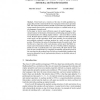Free Online Productivity Tools
i2Speak
i2Symbol
i2OCR
iTex2Img
iWeb2Print
iWeb2Shot
i2Type
iPdf2Split
iPdf2Merge
i2Bopomofo
i2Arabic
i2Style
i2Image
i2PDF
iLatex2Rtf
Sci2ools
129
click to vote
ICALP
2007
Springer
2007
Springer
Regular Languages of Nested Words: Fixed Points, Automata, and Synchronization
Abstract. Nested words are a restriction of the class of visibly pushdown languages that provide a natural model of runs of programs with recursive procedure calls. The usual connection between monadic second-order logic (MSO) and automata extends from words to nested words and gives us a natural notion of regular languages of nested words. In this paper we look at some well-known aspects of regular languages – their characterization via fixed points, deterministic and alternating automata for them, and synchronization for defining regular relations – and extend them to nested words. We show that mu-calculus is as expressive as MSO over finite and infinite nested words, and the equivalence holds, more generally, for mu-calculus with past modalities evaluated in arbitrary positions in a word, not only in the first position. We introduce the notion of alternating automata for nested words, show that they are as expressive as the usual automata, and also prove that Muller automat...
Alternating Automata | ICALP 2007 | Nested Words | Regular Languages | Theoretical Computer Science |
| Added | 08 Jun 2010 |
| Updated | 08 Jun 2010 |
| Type | Conference |
| Year | 2007 |
| Where | ICALP |
| Authors | Marcelo Arenas, Pablo Barceló, Leonid Libkin |
Comments (0)

